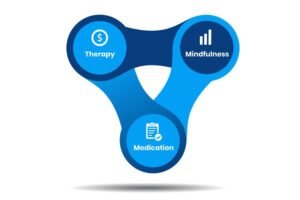ADHD Limerence is a distinctive disorder in which the emotional strength and imprisoning nature of ADHD interfere. Individuals with ADHD are characterized by high infatuation, fixation, or obsession, particularly in relationships. This is an emotional rollercoaster, and it is difficult to tell the difference between love and obsession.
The characteristics of ADHD Limerence include being impulsive, emotionally high, and emotionally low, which is likely to result in an inability to develop balanced relationships.
The combination of limerence and ADHD characteristics may pose a difficult task to deal with feelings, yet one may find solutions to cope. There are healthy ways of emotional balance with the right approach, understanding, and treatment.
What Is ADHD Limerence?
The complication of ADHD symptoms and limerence is known as ADHD Limerence. The term Limerence was coined by a psychologist named Dorothy Tennov in the 1970s. It is an obsessive stage of emotional attachment and infatuation towards another individual, and in most cases, results in unreasonable thoughts and actions.
In the case of ADHD, such emotional obsession is reinforced. The attention, impulsivity, and emotional regulation issues are linked to ADHD and contribute to making the limerence experience even more difficult. The people living with ADHD may exhibit obsessive behaviors and thoughts.
Limerence ADHD Symptoms
ADHD Limerence symptoms are peculiar and may differ with individuals. Nonetheless, the typical symptoms are:
- Persistent Thoughts: People with ADHD Limerence can have intrusive thoughts every time about their infatuation. These may turn into obsessive thoughts so that one cannot concentrate on anything.
- Impulsivity: ADHD causes people to be impulsive, which may lead to excessive messaging, purchase of lavish gifts, or grandiose romantic acts without any thought of the outcome.
- A minor act on behalf of the subject of interest might lead to overwhelming emotions of happiness, whereas non-reaction might spell out rejection and disillusionment.
- Hyperfocus: ADHD patients can be strongly focused on an individual may lead to the neglect of other valuable parts of life, including employment, family, or self-care.
Limerence ADHD Causes
1-Emotional Dysregulation
It is common to find that ADHD can be attributed to emotional dysregulation, whereby such individuals find it difficult to control extreme emotions. This dysregulation may lead to emotional ups and downs that are evident in limerence and may not be able to balance in romance.
2- Dopamine Dysfunction
Dopamine is a neurotransmitter that relates to reward and pleasure and is a crucial component of ADHD and limerence. Individuals with ADHD tend to experience lower dopamine levels, which may predispose them to the highly intense rewarding emotions of limerence.
3-Hyperfocus
ADHD hyperfocus can complicate the inability of individuals to switch off their obsession with a person. This intense focus on an individual may cause emotional burnout and relationship issues.
ADHD and Relationships: ADHD Obsessions
In love affairs, people with ADHD can have what can be termed as ADHD obsessions. They are compulsive thoughts and actions. It may be hard to control and usually results in the destabilization of relationships. ADHD obsessions can include:
- Overthinking: An analytical process of trying to figure out the other partner or what they are saying or doing.
- Constant Attention: ADHD individuals are always in need of constant validation or attention on the side of their partner, which can be too much and damaging to both parties
- Idealization: ADHD individuals can idealize their mate, seeing only good qualities there and neglecting possible defects.
- The resulting adhd and relationships obsession may cause the inability to uphold healthy boundaries and balance in relationships.
The resulting adhd and relationships obsession may cause the inability to uphold healthy boundaries and balance in relationships, and to make both partners flourish.
ADHD Love: Intensity and Obsession
ADHD love is usually extreme in terms of emotional intensity. Individuals with ADHD are usually passionate and enthusiastic about their love relationships. Such intensity is thrilling and crushing, and so can either result in euphoric heights or agonizing downs. Such a fervent attitude to love may be beautiful and cause problems with managing expectations and emotional responses. ADHD love without proper coping mechanisms will lead to a lot of stress, both in short-term and long-term relationships.
Limerence ADHD in Females
In females, ADHD Limerence can take different forms. Although men and women with ADHD might have similar reactions of being emotional and obsessed, women tend to internalize their feelings. Consequently, ADHD Limerence in females can manifest as:
1-Emotional Withdrawal
Women experiencing ADHD Limerence can conceal their obsessive interests, and as such, no one can easily realize how much emotion they are involved in it.
2-Ruminative Thinking
Women with ADHD can invest excessive time in examining their emotions and the actions of their ADHD limerence vs love interest, and this aspect results in rumination.
3-Relationship Anxiety
The relationship may suffer anxiety over the future of the relationship, which will lead to doubts and uncertainties as a result of the emotional intensity of ADHD Limerence. It is essential to understand the manifestation of ADHD Limerence in women to offer the management and intervention strategies.
How to Stop Limerence ADHD?

The treatment of ADHD Limerence is a very difficult task, but it can be stopped with the appropriate strategy. The following are some of the good strategies:
1- Therapy
Cognitive Behavioral Therapy (CBT) proves to be especially helpful in helping people and those with limerence re-examine their obsessive thoughts and form healthier emotional reactions.
2-Mindfulness
Mindfulness may make people more aware of their emotional state and hence control the obsessive thoughts before they get out of control.
3-Medication
The medication for ADHD (stimulants and non-stimulants) will allow balancing the impulsivity and emotional regulation, and it will be possible to cope with the obsessive tendencies more easily.
The creation of a personal support system, self-compassion, and professional assistance are critical in the treatment of ADHD Limerence.
Treatment of Limerence ADHD
The treatment of ADHD Limerence should focus not only on the symptoms of this disorder, but also on the emotional obsession of limerence. A combination of treatment, therapy, and lifestyle changes, along with ADHD medication, would work. Here’s how:
1- ADHD Medication
Attention, impulsivity, and emotional dysregulation, with the help of stimulants and non-stimulants, can reduce the burden that ADHD has on romantic relationships.
2-Therapy
Therapy assists people in restructuring their dysfunctional thought patterns and acquiring emotional control.
3- Support Groups
Support groups of ADHD members can also help offer tips and coping mechanisms. Healthier emotional experiences can be achieved through a holistic approach, which involves medication, therapy, and lifestyle changes.
Final Thoughts
ADHD Limerence is a distinctive and difficult condition that is characterized by the strong emotional obsession of limerence and the impulsivity and emotional dysregulation of ADHD. Knowing the symptoms, causes, and treatment plan, people will be able to control their emotions and build healthy relationships. ADHD Limerence does not necessarily determine your mood state- there are ways to cope with it and achieve a balance in romantic life.
For more information and personalized guidance on managing ADHD Limerence, consult Mental Behavioral. You can get help to understand the connection between ADHD and limerence, providing tailored strategies for emotional regulation and relationship management.
FAQs
What is ADHD Limerence?
ADHD Limerence is a condition where one type of ADHD combines with limerence, which is the intense emotional state of infatuation or obsession towards someone.
Does ADHD cause falling in love too fast?
Yes, people with ADHD tend to have fast emotional attachment, which is motivated by impulsivity and hyperfocus that are inherent to ADHD. Such immediate bondage may occasionally cause unrealistic expectations and emotional disturbances if the relationship is not going as planned.
What is the range of the impact of ADHD Limerence on relationships?
The result of this obsession may lead to emotional regulation, communication problems, and difficulty with boundary-setting, making it hard for the two partners to maintain a healthy, reciprocal relationship.
What are the effective treatments for ADHD Limerence?
The combination of Cognitive Behavioral Therapy, mindfulness, and ADHD medication is the most common approach to treatment. These measures are beneficial in assisting individuals to manage their emotional intensity, become less impulsive, and build healthier dynamics of relationships.








